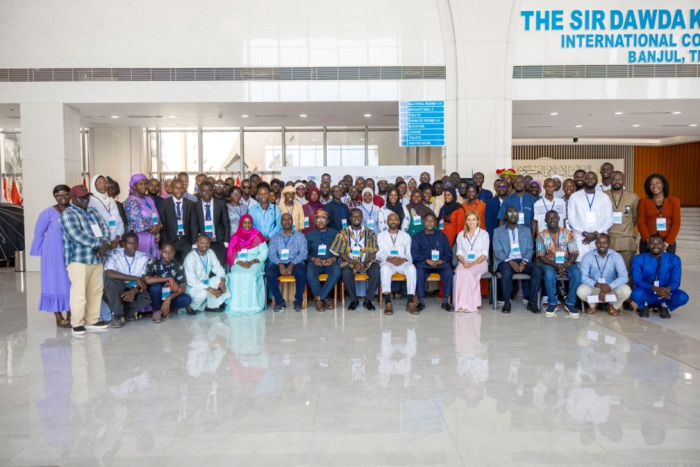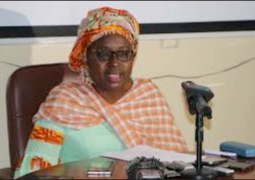
The conference aims to enhance the visibility of MRCG at LSHTM, strengthen partnerships, and foster collaboration across health, technology, and academic sectors to advance the application of data science for health research.
Delivering the keynote address, Dr. Bubacarr Bah, head of Data Science at MRCG at LSHTM, said the event marked the culmination of a month-long series of activities designed to build awareness and capacity around AI and data science.
“We conducted workshops for leadership and staff, outreach programmes in schools across LRR, CRR, URR and NBR to inspire students about data science careers, and a series of Friday seminars featuring distinguished speakers,” Dr. Bah said. “We also organised a three-day hackathon, and the winners will be presenting their innovative solutions today.”
Dr. Bah explained that the summit offers a platform for plenary talks, poster sessions, and stakeholder engagement to highlight ongoing work within and beyond the MRCG.
“We are glad to see representatives from the University of The Gambia, the Ministry of Health, and other partners joining us today to collectively explore how AI and data science can reshape health research in the country,” he added.
Speaking at the opening, Prof. Umberto D’Alessandro, unit director of MRCG at LSHTM, underscored the importance of embracing artificial intelligence in health research.
“We are only at the beginning of understanding AI’s potential not just for research, but for healthcare delivery itself,” he said. “While AI opens immense opportunities, it also presents challenges and risks we must carefully manage. This conference is an important step toward building capacity and leadership in this rapidly evolving field.”
Prof. D’Alessandro commended the organisers, particularly Dr. Bah and his team, for spearheading the Data Science Awareness Month and fostering critical dialogue around AI applications in Africa’s health landscape.
Also addressing the gathering, Laura Merson, head of Clinical Research at Institut Pasteur de Dakar, emphasised that the success of AI in healthcare depends on the quality of the data being used.
“AI is not just about algorithms or programmes, it’s about what you feed into them,” she noted. “Good data, especially clinical data, is essential. Without inclusive, well-managed data systems, AI cannot serve the people it’s meant to benefit.”
She recounted her experience working on global health trials and data collection during the West African Ebola outbreak, highlighting the importance of creating sustainable data platforms within Africa to prevent data loss and ensure long-term accessibility for research.
The summit concluded with a renewed call for collaboration, innovation, and local ownership in harnessing the power of data science and artificial intelligence to improve health outcomes in The Gambia and beyond.




